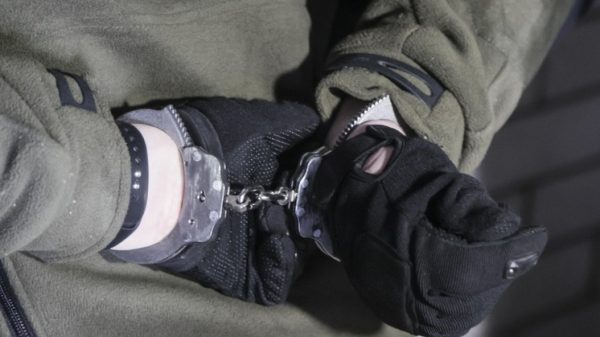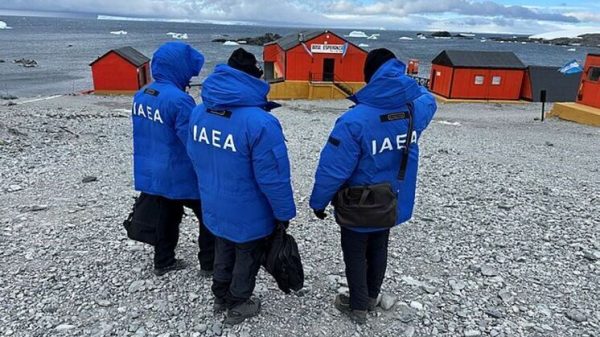 Colin Farrell in Sugar Photo: Apple TV+
Colin Farrell in Sugar Photo: Apple TV+
This is the worst thing that's happened to Colin Farrell since he turned into Johnny Depp at the end of the first Fantastic Beasts movie. Until this weekend, the actor was filming his captivating L.A. noir detective series Sugar on Apple TV.
But then came episode six and a shocking revelation that many condemned as one of the worst small-screen bombs since a presumed-dead Bobby Ewing showed up in a shower in Dallas, and the entire season was written off. like ex-wife Pamela's fever dream.
The twist left viewers stunned, annoyed and confused. «I wasn't sure if this was real or some kind of drug hallucination,» wrote one viewer of the show's big twist.
The big surprise is that Farrell's hard-nosed detective, John Sugar, isn't just aloof, hippy-dippy L.A. style. He is literally an alien — a blue-skinned visitor from another world who wanders there like a detective to deepen his understanding of humanity.
The discovery turned out to be controversial, to say the least. Some viewers applauded the show's willingness to take risks. But many others are wondering why Apple couldn't have just stuck with the original premise of Colin Farrell being an asshole in a morally ambivalent Los Angeles, right before James Ellroy? The show was great. Why mess up a successful formula?

The «Colin Farrell is an Alien» twist also raises a deeper question: Why can't TV and movies make big twists anymore? Remember the surprise that happened 11 years ago at the Red Wedding in Game of Thrones, when half the Stark family attended the lavish wedding and didn't live long enough to suffer from a hangover the next morning? It was quite a shock (unless you were one of the millions who read the original books) and an example of a perfect turn of events.
The Red Wedding worked because it didn't seem far-fetched. In retrospect, it was abundantly clear that the Starks had fallen into a trap. They put the noose around their necks when Robb Stark refused an arranged marriage to the daughter of minor noble Walder Frey — and appointed his useless cousin to tie the knot in his place.
Robb's strategic mistake leads to Walder having to make a secret deal with the Starks' mortal enemies, the Lannisters. So, in a way, the Red Wedding was not a bomb, but a reminder of the harsh reality of Game of Thrones, where power is the main currency and weak, decent people like Robb Stark invariably end up on the chopping block.
The Sugar Twist is the exact opposite. Yes, there were some vague hints early in the season that there was more to John Sugar than meets the eye. While traveling around Los Angeles, he suffers from random headaches, and in a previous episode he reveals that due to his unusual metabolism, he is unable to get drunk. However, according to producer Simon Kinberg, the Colin as Alien storyline was met with considerable resistance.
 Bruce Willis in The Sixth Sense Photo: AJ Pics/Alamy Stock Photo
Bruce Willis in The Sixth Sense Photo: AJ Pics/Alamy Stock Photo
“A lot of places were scared by this revelation that it seemed like mixing or mashing genres was too risky,” Kinberg told Deadline. According to him, several streamers and networks expressed doubts about this turn of events. This was a turning point for them.
“Why can’t it just be a detective show? There were a lot of places that were scared by this revelation because they thought mixing or mashing genres was too risky,” he said.
In the end, it was Apple that greenlit the Sugar Is Starman plot » “Apple was the strongest supporter of this vision, which not everyone saw,” Kinberg said.
Kinberg may be satisfied that Sugar delivered a bombshell. Others, however, will despair at the clumsy reveal and wonder why Hollywood more generally has forgotten the art of the twist.
 Florence Pugh in the film “Don't Worry Darling” Photo: Merrick Morton
Florence Pugh in the film “Don't Worry Darling” Photo: Merrick Morton
Consider Olivia Wilde's 1950s relationship drama Don't Worry Darling, in which Florence Pugh's character finally realizes she's trapped in a virtual reality where her husband has imprisoned her against her will. Or Knives Out: Glass Onion, where Janelle Monáe's Andy turns out to be her twin Helen, a shocker who came out of nowhere and understandably took viewers by surprise. Both twists fall into the audience's lap out of nowhere. Instead of enriching the script, they cheapen it. It feels like the filmmakers want to be smart for the sake of the plot rather than making meaningful additions to the plot.
One director who loves a good twist is M. Night Shyamalan, who hopes to completely subvert audience expectations. again with this year's «Trapped,» in which Josh Hartnett plays a serial killer who accompanies his daughter to a pop concert only to realize he's being pursued by the police.
Will Shyamalan be able to pull the rug out from under us once again? He can already claim to have created the greatest cinematic twist of the last 30 years with The Sixth Sense, which stunningly revealed that Bruce Willis' character was a ghost.
The golden rule, says Shyamalan, is that the twist shouldn't be a shock that comes out of nowhere, but a missing piece of the puzzle that you didn't realize was missing until the very last moment. It shouldn't confuse the audience like Sugar did, but it should make sense.
«What you're left with at the end of the movie should tell you about what you saw… When you stick to the landing page, you give them the opportunity to say, 'This is how to interpret everything you watched,'» he said.
 Kevin Spacey in The Usual Suspects Photo: TCD/Prod.DB/Alamy Stock Photo
Kevin Spacey in The Usual Suspects Photo: TCD/Prod.DB/Alamy Stock Photo
There are many examples of this trick performed to perfection. Nicole Kidman's 2001 ghost story «The Others», in which it is revealed that Kidman and her children are the ghosts haunting the family and not the other way around. Edward Norton in Primal Fear, in which his innocent pursuits as a choir boy turn out to be an act that deceives his inattentive and smarmy lawyer (Richard Gere). Kevin Spacey as Keyser Söze in The Usual Suspects, a turn achieved not with blue alien makeup but with a simple change in the character's gait.
These turns have one thing in common. At the moment they are unexpected. But the more we think about them, the more meaning they make. It's a far cry from Sugar and Farrell's rigging — a betrayal of both Farrell's superb performance and the audience's investment in a grounded detective story that turns out to be wet sci-fi bombast.
Turn and Scream: Five Great Screen Surprises  Nicole Kidman in The Others Photo: Moviestore Collection Ltd/Alamy Stock Photo Other
Nicole Kidman in The Others Photo: Moviestore Collection Ltd/Alamy Stock Photo Other
It was a role Nicole Kidman was born to play — a mother living in a creepy Jersey house where her children's sensitivity to daylight forces her to keep the curtains closed. At night, her character Grace hears strange sounds that make her believe that the house is haunted. But in a devastating ending, it is revealed that Grace and her children are ghosts, and that she has repressed her memories of killing her offspring and then stabbing herself.
Sixth sense
“I see dead people,” says Joel Osment’s psychic high school student Haley at the beginning of M. Night Shyamalan’s 1999 blockbuster. Bruce Willis's character, a child psychologist who empathizes with a traumatized child, becomes a friend and confidant. But when he gets to the bottom of the boy's illness, he discovers that he actually sees dead people — and he (Willis's protagonist) is one of them.
Game of Thrones
House Lannister's favorite tune, «The Rains of Castamere,» begins, and suddenly Catelyn Stark realizes it's a trap. The wedding of Edmure Tully and Roslyn Frey was just a ploy by Walder Frey to get revenge on the Starks after her son Robb refused an arranged marriage. In hindsight, it makes sense. But that won't do much good for the Starks, who were cut down by Freys and the Lannisters before they even had a chance to finish the wedding banquet in this 2011 episode that became an instant sensation.
The Usual Suspects
Who is Keyser Söze is the question that haunts everyone in Bryan Singer's twisted 1995 thriller. It's only in the final minutes that the truth is revealed: Kevin Spacey's shy and confused «Verbal» Kint pulls the strings — the shock that made the film a summer hit.
Planet of the Apes
Throughout this 1968 sci-fi adventure, Charlton Heston's character wondered where in the galaxy he ended up. The devastating revelation comes in the final scene when he sees the Statue of Liberty sticking out of the sand. A dystopian world dominated by talking, horse-riding gorillas and chimpanzees is… Earth!





















































Свежие комментарии